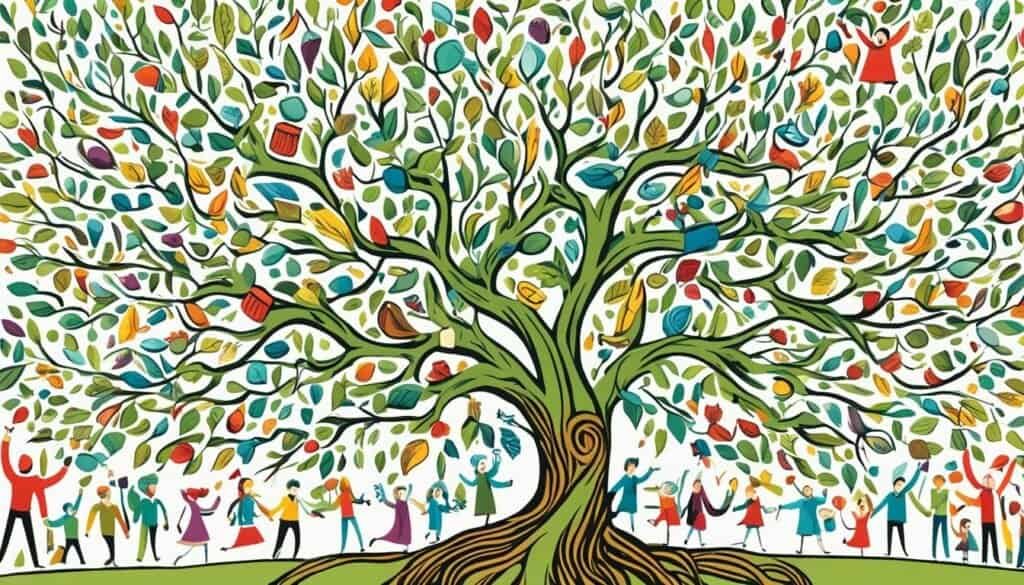Have you ever wondered how personal connections were formed in the early Christian community? In the book of Romans, the Apostle Paul showcases the power of personal touches, leaving a lasting impact on the believers in Rome. From heartfelt farewells to affirming spiritual gifts, Paul’s words reveal a deeper level of connection and appreciation for the members of the early church.
Throughout his letter, Paul takes the time to commend and recognize community leaders for their contributions. But what was the significance of these commendations? And how did they inspire and motivate the believers in Rome to continue their work? Join us as we explore the personal touches in the book of Romans and uncover the ways in which Paul established and strengthened relationships, affirmed spiritual gifts, and bid farewell with warm wishes.
Bulletpoints:
- Paul’s heartfelt farewells and commendations reflect the deep connections he had with the early Christian community in Rome.
- Recognizing and appreciating the contributions of community leaders through personal touches can inspire and encourage others.
- Apostle Paul’s letters serve as a testament to the power of building relationships from afar.
- Phoebe, a deaconess, is highlighted as a role model, showcasing the inclusive nature of the early Christian community.
- Acknowledging and affirming spiritual gifts in the community helps strengthen individuals’ sense of purpose and value.
The Power of Recognition: Highlighting Achievements
In the book of Romans, Apostle Paul goes beyond imparting spiritual teachings; he also takes the time to recognize and celebrate the achievements of certain individuals within the early church. These commendations serve as a powerful example of the impact recognition can have on individuals and the community as a whole.
By giving these individuals a shout-out, Paul not only acknowledges their contributions but also showcases the power of recognition to inspire and encourage others. These commendations serve as a testament to the importance of appreciating and affirming the achievements and efforts of those around us.
In his letter to the Romans, Paul demonstrates how a simple word of recognition can uplift and motivate others to continue striving for greatness. Whether it be highlighting someone’s dedication, prowess in their spiritual gifts, or their active role in serving the church, these commendations reaffirm the value and significance of each individual’s contributions. They remind us that every achievement, no matter how big or small, is worthy of acknowledgment.
Paul’s recognition not only instills a sense of pride and accomplishment in the individuals being commended but also fosters a culture of appreciation and encouragement within the early church. It shows that a community that actively acknowledges and celebrates achievements is one that thrives and grows together.
“Recognition is the fuel that powers the motivation and growth of individuals and communities. In Romans, we see the profound impact it can have in inspiring others and fostering a culture of support and encouragement.”
Recognizing Achievements: Inspiration for All
Paul’s commendations in Romans provide inspiration for believers across time and place. They remind us of the power of recognition to uplift and motivate others, even in the face of challenges and obstacles.
When we take the time to celebrate the achievements of those around us, we create an environment that fosters growth, builds confidence, and promotes collaboration. Recognizing the efforts and successes of individuals within our communities not only encourages them to continue excelling but also inspires others to step up and contribute their unique gifts and talents.
By shining a light on the achievements of others, we not only honor their hard work but also create a ripple effect of positivity and encouragement. It is through these acts of recognition that we can cultivate a community where everyone feels seen, valued, and motivated to achieve their best.
| Benefits of Recognition: | Impact on Individuals and Community: |
|---|---|
| 1. Boosts morale and motivation | 1. Inspires individuals to strive for excellence |
| 2. Fosters a sense of belonging and appreciation | 2. Builds a culture of support and encouragement |
| 3. Increases productivity and engagement | 3. Strengthens relationships within the community |
| 4. Enhances personal and professional growth | 4. Promotes collaboration and collective success |
Building Relationships from Afar: Sending Greetings
Despite not personally knowing all the believers in Rome, Apostle Paul went the extra mile to establish and strengthen relationships through his letters. By sending heartfelt greetings, Paul bridged the distance between himself and the early Christian community, cultivating a sense of belonging and connectedness.
Paul understood the power of building relationships, even from a distance. His letters served as a means of maintaining fellowship and support among believers who were physically separated. Each heartfelt greeting conveyed not only Paul’s care and affection but also his desire to connect with every individual, regardless of their location.
“Greet Andronicus and Junia, my fellow Jews who have been in prison with me. They are outstanding among the apostles, and they were in Christ before I was.” – Romans 16:7
Paul’s personal touch extended beyond a mere formality. His words carried weight and significance, recognizing the unique contributions and importance of each believer. By sending greetings, Paul fostered a spirit of unity and encouraged mutual support within the early Christian community.
In his letters to the Roman believers, Paul showcased the power of connection and the value of building relationships, regardless of physical proximity. His example reminds us that genuine bonds can be formed and nurtured even when we are physically apart.
Key Takeaways:
- Building relationships is essential, regardless of distance.
- Heartfelt greetings can bridge the gap between individuals.
- Paul’s letters demonstrated a genuine desire to connect with every believer.
- Personal connections fostered unity and mutual support within the early Christian community.
| Greetings in Romans | Key Message |
|---|---|
| Greet Andronicus and Junia (Romans 16:7) | Recognizing outstanding believers |
| Persis, Rufus, Asyncritus, Phlegon (Romans 16:12) | Valuing individuals for their unique contributions |
| Greet one another with a holy kiss (Romans 16:16) | Promoting a culture of love and affection |
Through his greetings in Romans, Paul demonstrated the power of personal connections, affirming the value of every believer and fostering a strong and vibrant early Christian community.

Commending Key Figures: Phoebe the Deaconess
Within the early Christian community, there were individuals who stood out as role models, exemplifying strong leadership and unwavering faith. One such key figure is Phoebe, a deaconess mentioned in Paul’s letter to the Romans. Her commendation by Paul highlights the importance of recognizing and appreciating influential women within the early church.
Phoebe’s role as a deaconess showcases the inclusive nature of the early Christian community, where both men and women had significant responsibilities and contributions. As a deaconess, Phoebe would have played a vital role in serving the church, supporting the needs of fellow believers, and providing spiritual guidance to those within her congregation.
“I commend to you our sister Phoebe, a deaconess of the church in Cenchreae.”
Paul’s commendation of Phoebe not only highlights her individual worth and dedication to her role but also serves as an affirmation of the value of all women within the early church. It breaks gender barriers and emphasizes the importance of female leaders in nurturing and strengthening the burgeoning Christian community.
Phoebe’s commendation acts as a powerful reminder that leadership and influence are not limited by gender or societal expectations. Her example inspires believers, both then and now, to embrace their calling and serve others with humility and conviction.
Phoebe: An Encouragement for Today
The recognition and commendation of Phoebe serve as a timeless reminder of the diverse roles and contributions individuals can make within the body of Christ. Her example encourages us to look beyond traditional expectations and empower women in leadership positions, recognizing their unique strengths and talents.
Just as Phoebe’s commendation fostered inclusivity, let us honor and uplift all believers, regardless of gender, who serve their communities faithfully, providing role models for generations to come.
Now, let’s take a closer look at the significant role Phoebe played in her community:
| Phoebe, Deaconess of the Church in Cenchreae |
|---|
| Key Attributes: |
|
| Notable Achievements: |
|
Through her humble service and dedicated leadership, Phoebe leaves a lasting legacy as a key figure within the early church. Her commendation serves as a reminder to recognize and celebrate the influential women who continue to impact communities and inspire others today.
Recognizing Spiritual Gifts: Workers, Leaders, and Helpers
In the bustling community of believers in Rome, Apostle Paul takes the time to recognize and affirm the diverse spiritual gifts present among them. Whether individuals served as workers, leaders, or helpers, Paul understood the invaluable contributions each person brought to the community, strengthening their sense of purpose and value.
“Each one of us has a role to play in the body of Christ. Some are gifted with practical skills, tirelessly serving others. Others possess the ability to lead and guide the flock, providing wisdom and direction. And let us not forget the helpers, those who offer a helping hand and support, ensuring the smooth functioning of our community. Each gift is essential.” – Apostle Paul
Paul’s recognition of these spiritual gifts helps believers in Rome understand their unique role within the community. It promotes a culture of appreciation, where every individual’s contributions are valued and affirmed. This recognition fosters a sense of belonging and encourages believers to utilize their gifts for the greater good.
Affirming Contributions with examples
Let’s take a look at some examples of individuals whose spiritual gifts were recognized and affirmed by Paul:
| Name | Gift | Contribution |
|---|---|---|
| Priscilla and Aquila | Teachers | They guided and instructed many in the ways of the Lord, deepening their understanding and faith. |
| Phoebe | Deaconess | She exemplified servant leadership, caring for the needs of the community and embodying the values of compassion and grace. |
| Junia | Missionary | She fearlessly spread the Gospel, bringing the message of salvation to distant lands and inspiring others to do the same. |
These individuals, among many others, served as examples of the different gifts present within the early church. Their contributions affirmed the diverse ways in which believers could impact the community and furthered the mission of sharing God’s love with the world.

The image above perfectly encapsulates the idea of recognizing spiritual gifts in action. It depicts a diverse group of individuals working together, each utilizing their unique talents and gifts to build a thriving community of believers.
By recognizing and affirming the spiritual gifts of workers, leaders, and helpers, Paul set a powerful example for the believers in Rome. His words continue to resonate with us today, reminding us of the importance of valuing and affirming the contributions of every member within our own communities of faith.
What Personal Touches Can We Find in the Theme of Hope for the Future in Romans?
The theme of hope for the future in Romans is closely tied to the concept of the coming of the kingdom in Romans. Paul’s emphasis on righteousness, redemption, and the promise of God’s ultimate victory provides a personal touch that uplifts and empowers believers to look forward with hopeful anticipation.
A Community Built on Love: Final Warm Wishes
In bidding farewell to the early Christian community in Rome, Apostle Paul’s closing remarks convey a profound sense of warmth and genuine care. As Paul’s letters often emphasize, the foundation of this community was built on love. The early church in Rome was not just a gathering of individuals, but a tightly-knit network that supported and uplifted one another.
In his final words, Paul imparts his heartfelt wishes for the continued growth and harmony of the early church. These warm wishes serve as a reminder of the unity and love that bound the believers together. Paul’s closing remarks reflect his deep appreciation for the relationships he had built, even from afar, and the value he placed on their collective faith.
The early church in Rome, similar to many Christian communities today, relied on mutual support and encouragement. It is clear from Paul’s farewell that this spirit of camaraderie was vital to their spiritual growth and resilience. As modern-day believers, we can draw inspiration from their example and strive to cultivate a similar community built on love and genuine care for one another.
As we reflect on the final warm wishes expressed by Paul, let us be reminded of the importance of fostering strong relationships within our own communities. By embodying the love and unity demonstrated by the early church, we can create a nurturing environment where spiritual growth thrives, and individuals are supported in their journey of faith.
Affiliate Disclosure: "As an Amazon Associate I earn from qualifying purchases made from links in this post. We are a participant in the Amazon Services LLC Associates Program, an affiliate advertising program designed to provide a means for us to earn fees by linking to Amazon.com."

